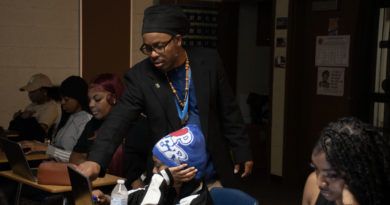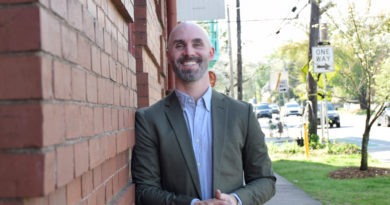Future educators undeterred by systemic challenges
The University of Georgia has seen a 15% decrease of enrollment in education programs. The National Center for Educational Statistics shows that the number of students earning degrees in education dropped nationwide from 105,000 in 2000 to just over 85,000 in 2020. One thing has become increasingly clear: America has a teacher shortage.
Jim Garrett, a professor of Social Studies Education in the Department of Mathematics, Science and Social Studies Education at UGA, believes that there are three main reasons for the shortage: the pay, public respect and the professional autonomy.
“Over the last twenty years or so, the public opinion of teachers has decreased. Teachers are increasingly under scrutiny from the public, parents and politicians,” Garrett said. “In that same amount of time, teachers have become less trusted to do their work. So rather than being able to come up with your own lesson plan and teach it to the students, the curriculum has teachers in a more top-down fashion. It takes away the professional freedoms that we have,” Garrett said.
In Clarke County School District, the average new teacher with a bachelor’s degree gets paid $47,789.85 annual salary. In Georgia, the average teacher salary, regardless of degree and years experience, gets paid $64,461. The national average for teacher salary is $68,469, and has declined 6.4%, or $3,644, over the past decade.
“People that graduated with a bachelor’s degree in education get paid thousands of dollars less on average on their salary than somebody in an area like engineering or accounting. There’s a financial disincentive,” Garrett said.
44% of Georgia’s newly hired teachers are dropping out of the profession by year five, almost double from 2010-2014, according to the Georgia Department of Education. The No. 1 reason people are leaving the field is the compensation. Since the cost of living has gone up, it is more expensive to own a house, pay the bills, get gas and buy other necessities. In CCSD the average salary for a teacher is $64,072.53, according to Dan Swartz, CCSD Executive Director of Human Resources.
Evelyn Lemus, a social studies practicum teacher who previously worked with Cedar government and economics teacher Tommy Houseman, enjoys seeing that she can make a difference in someone’s life. She says that she doesn’t go into education to be rich, but to make a difference.
“Even if it’s just as small as telling them that they are smart and that they can do it and seeing how they engage a bit more after hearing that, I love that it makes a difference to them,” Lemus said.
Casey Jokay, a practicum teacher in the English department who works with English teacher Tara Stuart, says it can be difficult to abide by the different rules that can limit how teachers operate their classrooms.
“You can’t always do what you want to do because you need to coordinate with your other teachers, admin, the state standards and state testing,” Jokay said.
Student teachers must be willing to adapt to what their mentor wants for their class. Charlie Wing, a social studies practicum who also worked with Houseman last semester, says that he had to learn how to balance his own methods with the students and the teacher’s goals.
“Finding the balance between interacting with the students, but not overstepping what the teacher is doing, is what I have had to learn how to do effectively,” Wing said.
School safety has also become a factor, as there have been at least sixteen school shootings this year as of March 6, 2024; last year, there were nearly 350 school shootings nationwide.
Still, Perla Villatoro, an English student teacher working with Hannah Doolittle, thinks that individual people are to blame — not schools.
“I think schools make school safe, but people make schools unsafe,” Villatoro says.
Some student teachers have little choice concerning where they are assigned to teach. UGA sends a form concerning the preferred school environment including distance from home, rural or urban areas and middle versus high school.
“One school is going to be on the West side of the city and one is going to be on the East side. Beyond that, we didn’t get much of a say on which was which,” Wing said.
Despite increasing hardships, some student and current teachers have found that the benefits often outweigh the adversity.
“I would not be happy if I’m not teaching for the rest of my life. This is invigorating and interesting. I need to be here,” Jokay said.




